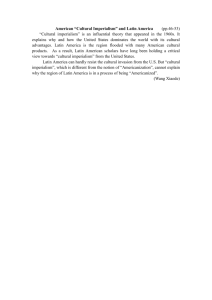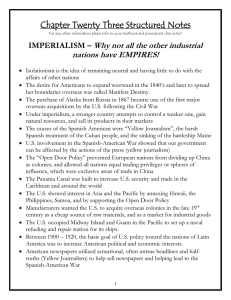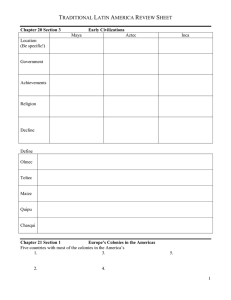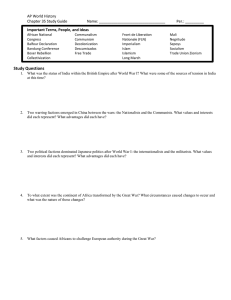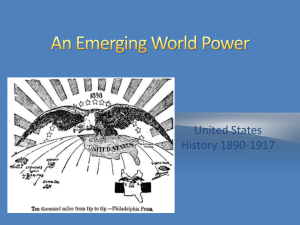188 Imperialism
advertisement
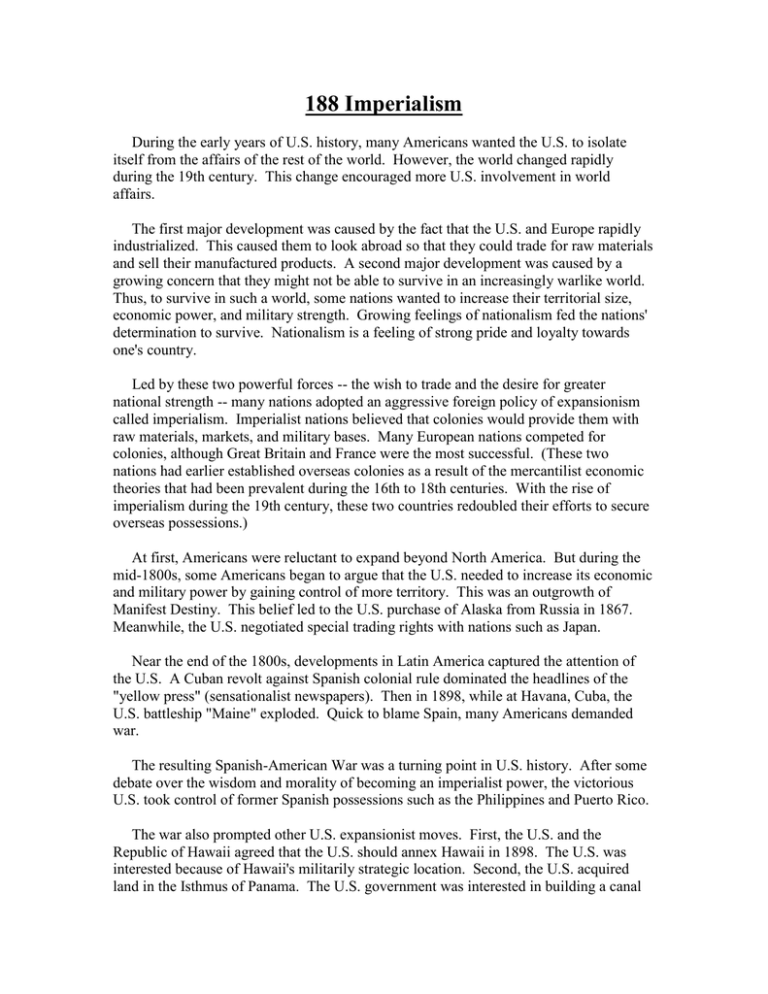
188 Imperialism During the early years of U.S. history, many Americans wanted the U.S. to isolate itself from the affairs of the rest of the world. However, the world changed rapidly during the 19th century. This change encouraged more U.S. involvement in world affairs. The first major development was caused by the fact that the U.S. and Europe rapidly industrialized. This caused them to look abroad so that they could trade for raw materials and sell their manufactured products. A second major development was caused by a growing concern that they might not be able to survive in an increasingly warlike world. Thus, to survive in such a world, some nations wanted to increase their territorial size, economic power, and military strength. Growing feelings of nationalism fed the nations' determination to survive. Nationalism is a feeling of strong pride and loyalty towards one's country. Led by these two powerful forces -- the wish to trade and the desire for greater national strength -- many nations adopted an aggressive foreign policy of expansionism called imperialism. Imperialist nations believed that colonies would provide them with raw materials, markets, and military bases. Many European nations competed for colonies, although Great Britain and France were the most successful. (These two nations had earlier established overseas colonies as a result of the mercantilist economic theories that had been prevalent during the 16th to 18th centuries. With the rise of imperialism during the 19th century, these two countries redoubled their efforts to secure overseas possessions.) At first, Americans were reluctant to expand beyond North America. But during the mid-1800s, some Americans began to argue that the U.S. needed to increase its economic and military power by gaining control of more territory. This was an outgrowth of Manifest Destiny. This belief led to the U.S. purchase of Alaska from Russia in 1867. Meanwhile, the U.S. negotiated special trading rights with nations such as Japan. Near the end of the 1800s, developments in Latin America captured the attention of the U.S. A Cuban revolt against Spanish colonial rule dominated the headlines of the "yellow press" (sensationalist newspapers). Then in 1898, while at Havana, Cuba, the U.S. battleship "Maine" exploded. Quick to blame Spain, many Americans demanded war. The resulting Spanish-American War was a turning point in U.S. history. After some debate over the wisdom and morality of becoming an imperialist power, the victorious U.S. took control of former Spanish possessions such as the Philippines and Puerto Rico. The war also prompted other U.S. expansionist moves. First, the U.S. and the Republic of Hawaii agreed that the U.S. should annex Hawaii in 1898. The U.S. was interested because of Hawaii's militarily strategic location. Second, the U.S. acquired land in the Isthmus of Panama. The U.S. government was interested in building a canal there because it believed it was necessary to protect U.S. interests in both the Atlantic and Pacific Oceans. The U.S. Navy could go between both oceans easier with such a canal. European nations were threatening to intervene in Latin American countries in order to collect debts owed to them by some governments there. President Theodore Roosevelt issued his Roosevelt Corollary to the Monroe Doctrine in 1904. The corollary stated that the U.S. could intervene in the internal affairs of Latin American countries in order to ensure that they would meet their international obligations. Both Presidents William Howard Taft and Woodrow Wilson exercised this power by sending U.S. troops into Latin America to "straighten out" economic problems or political unrest. Latin American nations thought these actions violated their sovereignty. Meanwhile in the U.S., many Americans objected to U.S. imperialist policies. They formed the Anti-Imperialist League and lobbied against annexing such lands as Hawaii and the Philippines. They argued that the U.S. betrayed its democratic principles by denying the people in these territories their right of self-determination. However, many, if not most, Americans supported U.S. expansion abroad. Some were highly ethnocentric and nationalistic. They believed both Americans and the peoples of U.S. possessions would benefit from expanding American culture and power. By the early 20th century, the U.S. was no longer an isolationist nation concerned only with affairs on its own continent. Motivated by a combination of economic, military, and ideological concerns, America had developed interests throughout Latin America and the Pacific. Like the nations of Europe, the U.S. had become an imperial power. In doing so, it had arrived upon the world stage.
